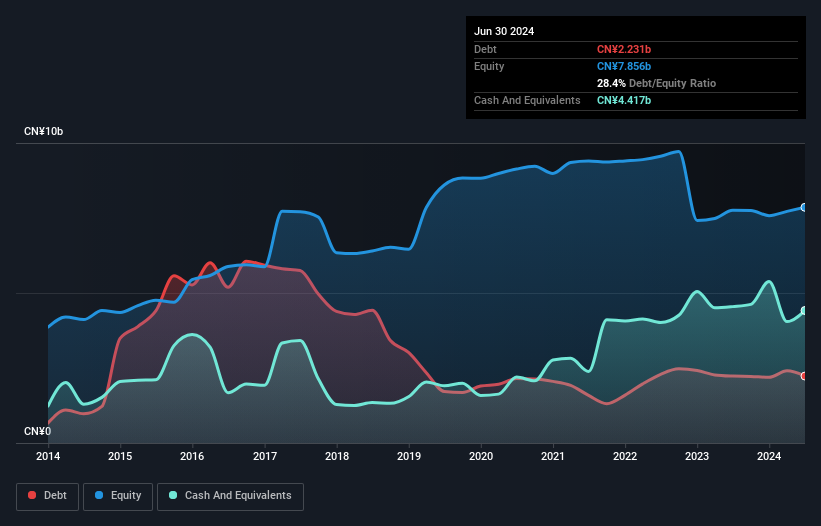Is BlueFocus Intelligent Communications Group (SZSE:300058) Using Debt Sensibly?
Howard Marks put it nicely when he said that, rather than worrying about share price volatility, 'The possibility of permanent loss is the risk I worry about... and every practical investor I know worries about.' It's only natural to consider a company's balance sheet when you examine how risky it is, since debt is often involved when a business collapses. Importantly, BlueFocus Intelligent Communications Group Co., Ltd. (SZSE:300058) does carry debt. But should shareholders be worried about its use of debt?
When Is Debt A Problem?
Debt assists a business until the business has trouble paying it off, either with new capital or with free cash flow. If things get really bad, the lenders can take control of the business. While that is not too common, we often do see indebted companies permanently diluting shareholders because lenders force them to raise capital at a distressed price. Of course, debt can be an important tool in businesses, particularly capital heavy businesses. When we think about a company's use of debt, we first look at cash and debt together.
View our latest analysis for BlueFocus Intelligent Communications Group
What Is BlueFocus Intelligent Communications Group's Debt?
As you can see below, BlueFocus Intelligent Communications Group had CN¥2.23b of debt, at June 2024, which is about the same as the year before. You can click the chart for greater detail. However, its balance sheet shows it holds CN¥4.42b in cash, so it actually has CN¥2.19b net cash.

How Strong Is BlueFocus Intelligent Communications Group's Balance Sheet?
According to the last reported balance sheet, BlueFocus Intelligent Communications Group had liabilities of CN¥12.6b due within 12 months, and liabilities of CN¥888.8m due beyond 12 months. Offsetting this, it had CN¥4.42b in cash and CN¥10.4b in receivables that were due within 12 months. So it can boast CN¥1.35b more liquid assets than total liabilities.
This surplus suggests that BlueFocus Intelligent Communications Group has a conservative balance sheet, and could probably eliminate its debt without much difficulty. Succinctly put, BlueFocus Intelligent Communications Group boasts net cash, so it's fair to say it does not have a heavy debt load! The balance sheet is clearly the area to focus on when you are analysing debt. But it is future earnings, more than anything, that will determine BlueFocus Intelligent Communications Group's ability to maintain a healthy balance sheet going forward. So if you want to see what the professionals think, you might find this free report on analyst profit forecasts to be interesting.
Over 12 months, BlueFocus Intelligent Communications Group reported revenue of CN¥61b, which is a gain of 47%, although it did not report any earnings before interest and tax. With any luck the company will be able to grow its way to profitability.
So How Risky Is BlueFocus Intelligent Communications Group?
Although BlueFocus Intelligent Communications Group had an earnings before interest and tax (EBIT) loss over the last twelve months, it made a statutory profit of CN¥15m. So when you consider it has net cash, along with the statutory profit, the stock probably isn't as risky as it might seem, at least in the short term. Keeping in mind its 47% revenue growth over the last year, we think there's a decent chance the company is on track. There's no doubt fast top line growth can cure all manner of ills, for a stock. When we look at a riskier company, we like to check how their profits (or losses) are trending over time. Today, we're providing readers this interactive graph showing how BlueFocus Intelligent Communications Group's profit, revenue, and operating cashflow have changed over the last few years.
If you're interested in investing in businesses that can grow profits without the burden of debt, then check out this free list of growing businesses that have net cash on the balance sheet.
Have feedback on this article? Concerned about the content? Get in touch with us directly. Alternatively, email editorial-team (at) simplywallst.com.
This article by Simply Wall St is general in nature. We provide commentary based on historical data and analyst forecasts only using an unbiased methodology and our articles are not intended to be financial advice. It does not constitute a recommendation to buy or sell any stock, and does not take account of your objectives, or your financial situation. We aim to bring you long-term focused analysis driven by fundamental data. Note that our analysis may not factor in the latest price-sensitive company announcements or qualitative material. Simply Wall St has no position in any stocks mentioned.
 Index Options
Index Options CME Group
CME Group Nasdaq
Nasdaq Cboe
Cboe TradingView
TradingView Wall Street Journal
Wall Street Journal